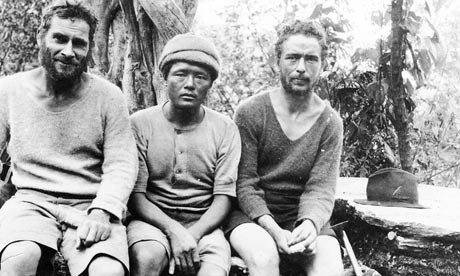
Charlie Houston, right, in 1936 with Pasang Kikuli (center) and British climbing legend Bill Tilman
I used to do a bit of climbing and a lot of climbing reading -- a deep and rich literature.
If you read much about American climbing history, you'll read about Charlie Houston, who made one of the most dramatic and tragic attempts at K2 in 1953, pioneered the modern study of high-altitude physiology, practiced and taught medicine for decades, and at one point ran the Peace Corp. Amazing man. He was one of many physicians and scientists who have loved climbing and made huge contributions in their day jobs as well. I once interviewed Houston for a story I did about his buddy Bradford Washburn, another climbing great who did great cartography, superb photography, and developed the Boston Museum of Science from a little house to one of the country's greatest science museums. In his late 70s when I interviewed him, Houston was still razor sharp and a pleasure to talk to. (And Washburn, climbing the stairs 3 flights to his office in the science museum, was hard to keep up with.)
Charlie died last week (other obits here, here, and here) at his home in Burlington, Vermont, a few miles up the road here. Bill Moyers' remembrance (you have to go to the site, as I couldn't find an embed code) includes some footage from, and the tale of, the he and some friends made on K2 in 1953, a tragic attempt that led him, in the superb chronicle he later published, to label K2 'the savage mountain."
It's a moving clip. Moyers has Houston describe the horrid outcome of the 1953 expedition, and his decision to stop climbing then so he could live to enjoy his family and do his medical practice and teaching in Burlington. He walked away from it cold, and went on to live a rich, fulfilling life. He and Moyers talk about something else for a bit. And then Moyers returns to the climb, "I know you did so much else, but I want want to return to that K2 climb again...," says Moyer. And Houston says, "The best thing I ever did."
A fuller account of the accident, is shown in the film Houston made about the 1953 expedition, "Brotherhood of the Rope," which occupies the bulk of this clip from a talk Houston recently gave at the local library in UVM. The film starts at 15:30, after some biographical talk from Houston. This too ends quite movingly, with an emotional reunion between the climbers and the sherpas when the climbers finally descend to the safety of base camp.
